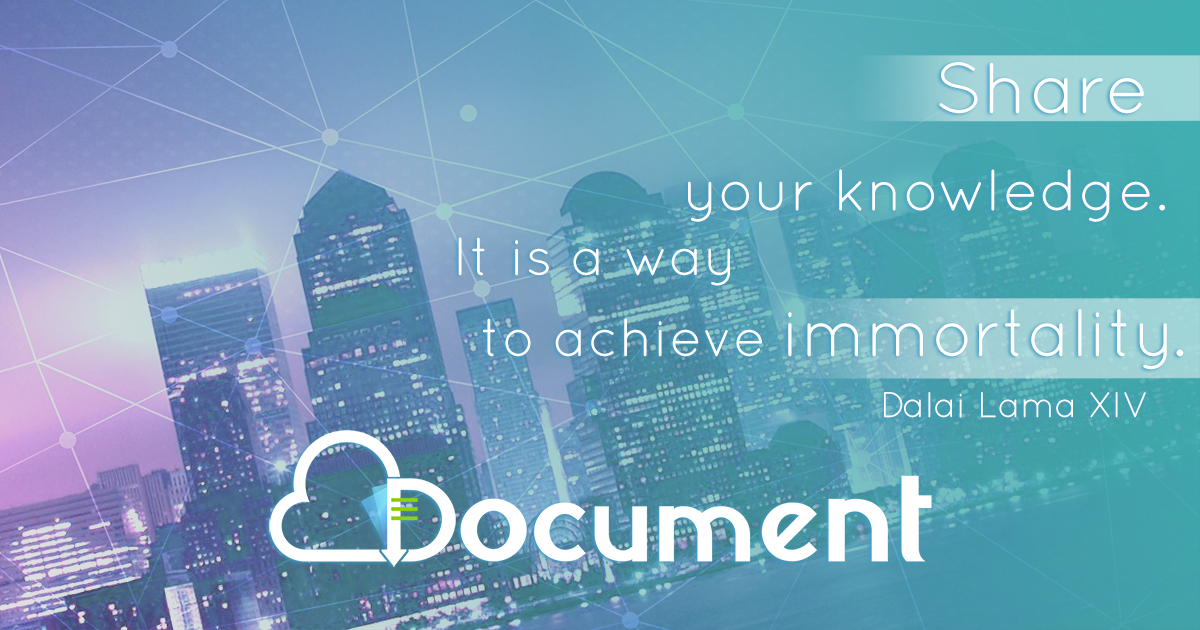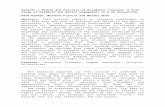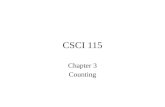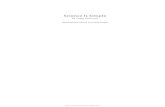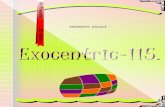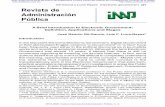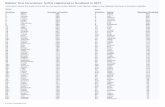Uvalle 115 Revista de Administración...
Transcript of Uvalle 115 Revista de Administración...

Uvalle Public adminstration challenges 115
Contemporary Public Administration Challenges
Ricardo Uvalle Berrones*
Introduction
Modern society attrition understood as the industrial society that formedin XVII century and its development with positive yield until the seventiesfrom the past millennium, enforces to examine and reassess the Statepurposes, government tasks and Public Administration functions. So,the current world gets grow with conditions that accelerate the eventsthat convert the patrons actually of the individual and collective life onmore plurals, competitive, and exacting environments.
The fall of the Berlin Wall in 1989 has as an effect that, on october3rd 1990, the reunification of the German Federal Republic and theGerman Democratic Republic to give opportunity to just one nationthat was divided since the Second Worldwide War. This eventaccelerates the Central European authoritarian regime, finishing theCold War period and, quoting Francis Fukuyama, capitalism triumphsover the policies and officialdom of socialism with the proclamation ofeconomic freedom and policies with an Occidental vision on societiesthat were for a long time, closed and tribal. In consequence, the globalrelationships spread all over the planet, provoking capital, properties,and services interchange to be bolstered not by machined and indus-trial systems, but by production ways that propel digital processesand network systems with electronic advance. They are, therefore,levers for the market economy development based on the basis ofcompetence and innovation.
Revista deAdministraciónPública
*PhD in Public Administration from Universidad Nacional Autónoma de México(UNAM). Full time Associate Professor “C”. Facultad de Ciencias Políticas y Socia-les (School of Social and Political Sciences) from UNAM. Center for the Study ofPublic Administration Coordinator from UNAM. Member of the Research NationalSystem, recognition granted by Secretaría de Educación Pública (SEP) and Con-sejo Nacional de Ciencia y Tecnología (CONACYT). Former Research MexicanAcademy in Policies President 1998-1999. Author of several books and articles onGovernment, Public Administration and Public Policies.
Esta revista forma parte del acervo de la Biblioteca Jurídica Virtual del Instituto de Investigaciones Jurídicas de la UNAM www.juridicas.unam.mx http://biblio.juridicas.unam.mx
DR © 2008. Instituto Nacional de Administración Pública, A. C.

116 Revista de Administración Pública XLIII 1
The intensive and diversified expansion from the global effecthas implied that the time-space relation be one of the most importantfactors to situate the new dynamic to the public societies and publicadministrations. Following this type of logic, public institutionsrelationship with its governed citizens considers some elements: non-waiver of democracy and the right State because they are fundamen-tal pillars for modern society development.
It is very important to highlight that administrative institutions arenot only understood in institutional areas of the State life, but also inthe public sphere of the society; it gets integrate by libraries, streets,teaching centers, forums, places, media, museums, recovery centers,between other elements. So, the debate, deliberation, and speech areresources of the freedom and democratic societies that individuals nojust invoke and request but they utilize to raise communicationrelationships with authorities and other civil life organizations.
There are, in consequence, new communication bridgesbetween the civil society and the State by the publication of its work.There are new relations to understand how since the society exigenciesfor the quality and efficiency are the constant advertisings from citizensto administrative offices, political rulers and governmental officialdom.There are advertisings that have like purpose the public topics to beextensive to the citizens by participation, collaboration, and coresponsibility about public policies.
Now the governor-governed relation is more open and direct, itembroils the Administration systems redesign over the logic to combi-ne the efficiency with the democracy values. Therefore, PublicAdministration has actors, conditions, troubles, and times that theyobligate to refocus them since a government optic. As naturals,economics, political, socials challenges as technologic are elementsthat have relation and exert pressure over administrative institutions;that reason obligates the answers to be more strategic and effectives.
Contemporary Public Administration lives on times of vertiginouschanges, which demands its social and policy responsibility to be validby institutional management effective means.
The purpose of these ideas is to analyze and explain challengesthat Public Administration faces with base on contemporary worldcomplexity. It highlights organized and informed societies, exigencyfor institutional efficiency into institutional and policy level, life qualitygrowth, citizen correponsibility and State importance about publicdirection processes and new paths of the democratic government(Peters, 2005:592) (Castelazo, 2007:52-53).
In order to present a layout, the work is structured as follows:
Esta revista forma parte del acervo de la Biblioteca Jurídica Virtual del Instituto de Investigaciones Jurídicas de la UNAM www.juridicas.unam.mx http://biblio.juridicas.unam.mx
DR © 2008. Instituto Nacional de Administración Pública, A. C.

Uvalle Public adminstration challenges 117
1) Context; 2) State sense; 3) Adaptive structures; 4)Management and results; 5) Collaboration and co-responsibility; 6)Quality and legality; and 7) Political competence.
ContextContemporary times are dynamics and complexes; they do not havepredicable and invariables contexts; they have turbulences that reflectnew life conditions and they show important modifications on theorganization and power exercise, on which, intercede governmentalforces like that correspond to the civil society.
In consequence, public institutions are not strange to changesthat society and State live intensely. It enforces to check governmentcompetences effective and continually. There is not rest point andlingering pauses for public institutions due to the importance of troublesthat they attend. These troubles have a big interdependence andcomplexity that increase the social and policy relations tension. It meansthat institutions must to produce new capacities of public managementthat allow landing to that lacks and demands from general and commonlife to avoid that answer to be deficient, insufficient, or erratic.
Administration nature from collective troubles must be examinedand revalue in front of events that mean actuality; it is not easy tounderstand through inoperative and obsolescent archetypes thatconceive the actuality from invariable equilibriums because they aresupported by dome establishments; they omit the dynamic from hori-zontal powers and they are determinants about forms and powerrelationships.
Actually, there is a combination in terms of historic and policyphenomenon that they are not easy to understand since reductionismand historic optic (Suárez, 2005:26-28) from modern society, becauseit gets form since Industrial Revolution on XVII century, when relationssocial, policy, economic politics are shifted and it announces thetriumph (Huntington, 1991:104) of civil rights, democracy, market, andparliament, which provokes that king (Executive power) loses(Huntington, 1991:104) policy force in front of the community. Thisphenomenon increases with policies revolutions that on XVIII centuryannounces the civil life and policy advent and that corresponding tothe right State (Hayek, 1991:103-104)) over the base from freedomand legal equality of people.
In present, societies live with tendencies because of globalization(Ayala,2003:51) characterized by public trouble, science andtechnology accelerated innovation, market economies boom, socialand officialdom regimes end in Oriental Europe, information andknowledge importance to form productive life value and added value
Esta revista forma parte del acervo de la Biblioteca Jurídica Virtual del Instituto de Investigaciones Jurídicas de la UNAM www.juridicas.unam.mx http://biblio.juridicas.unam.mx
DR © 2008. Instituto Nacional de Administración Pública, A. C.

118 Revista de Administración Pública XLIII 1
that it needs, community integration of Estates, regional blocksformation, common markets integration, retirement and pensionspolicies check, central structures debilitation, local forces boom, heatingplanet risks if there is not control of carbon dioxide (CO2), methane(CH4), nitrous oxide (N20), furthermore three types of fluorated indus-trial gases such as: hydrofluorocarbons, perfluorocarbon and sulphurhexafluoride (Cruz, 2008:16); ample geographic zones deforestation,glacial melting, foods crisis, lacerative effect poverty, inflation increaseto worldwide level. It is not least important troubles about bio combus-tibles production that in Peter Brabeck Letmathe words - UndertakingNestlé President… are ecologically waste and undefined ethically” andblame “fall justly over the attorneys of global heating” (cited by Elizondo,Reforma, negocios, p. 6). In this sense, another serious problem isthat “combustibles madness… is contributing to water scarcitybecause it is endemic… it requires 10,000 liters of water to producefive liters of ethanol” (cited by Elizondo, Reforma, negocios, p.6). Otherworldwide preoccupy problems get engage with health like epidemics,pandemics, and infections provoked by AIDS; so, terrorism, migrations,people traffic, and childlike prostitution are neuralgic problems and theyincise on society and Estate relationship.
These troubles have an important impact about institutions workand government processes over open societies (Suárez, 2005:25-26), which recognize individual action importance (Suárez, 2005:29)organized on informed and repliers collectivizes that are owns ofdemocracy and that it compels to check and reformulate efficacypatrons in public institutions, in particular, administrative character.Contemporary society gets development in stableness conditions,which implies that uncertainty to be way life that is important tounderstand and face with a better answer talent.
There is no exist therefore, right lines to carry out governmentprocesses neither impeccable, neat, and art full solutions; so, theunpredictable and coarse from contemporary life must to face severalstrategies that allow rationalizing better troubles and demands fromcommunitarian life having like orientation point that institutional solutionsare temporary and specials. Government processes must not beunderstood with prognostics range neither categorical prevention ofthe events, because there is not inertial opportunity on a world that isre accommodated and is transformed with intense velocity, in fact ofchaotic way.
The political and social problems sum, more natural characterdisasters –hurricanes, twisters, drought– obligate to revalue thegovernment tasks by sceneries design more realist and feasible.Before, to govern implicated to notify and procure that different parts
Esta revista forma parte del acervo de la Biblioteca Jurídica Virtual del Instituto de Investigaciones Jurídicas de la UNAM www.juridicas.unam.mx http://biblio.juridicas.unam.mx
DR © 2008. Instituto Nacional de Administración Pública, A. C.

Uvalle Public adminstration challenges 119
of State territory were occupied for denizens by colonization processesand human assents; the increase population criterion was determinantto occupy the geographic surface from the Estates, to protect bordersto the consider strategic importance of defensive and offensive systemsaccord Estate reason.
On modern society time, to govern implies to calculate actions,resources, and needs over numeric values precision to produce godsand services that society, market, and economy need for itsdevelopment; on relation with modern society, contemporary societyproclaims intangible values –civility, affiance, equity, justice, solidarity–that increase the complexity to govern because they are on relationwith collective and individual development from citizens to warrantycommon targets articulation over cooperation systems base, legitimateand recognition of ruled order. Public institutions have entered to anage that demands accredited dexterities and abilities to secure societydirection over democratic elements base having like axis that societiesevolved is intangibles and tangibles values conjugation.
So thus market economy needs government supports to secureits successful and efficient; too civil rights, political, and social demandefficiency and attention by governmental institutions to strengthen so-cial, political and legal equality relations because they are an importantpoint on century XXI democracy. Nowadays government compromisesare more numerous and recurrent with society and market economychallenges. It obligates to examine its actual capacities and value thatit needs to the future.
In this sense, future is not the expected or wished time; it mustnot be taken like a calendar, clock or chronometer way, sinus like asum of events that have a place of theological way, induced, andprovoked that they impact the present by volatile systems effect fromactors and conditions that influences.
Future must be discovered with political, methodologicalprospective exercises (Dror,1990:70) to anticipate it, manipulate it andinstitutionalized it with better government actions and from publiccapacity; it must be known athwart tendencies, trajectories, problems,and portages and they must be have relation with the likely andunexpected; certainty and uncertainty; order and disorder; regularityand disruption; reforms and contra reforms; dairies and contingences;decisions and actions; accommodations and resources; legality andlegitimacy; political and policies; rulers and citizens.
Originating future is not found on present by a chronological way,sequenced and anticipated, sinus it must be understood like a targetor value about itself (Dror, 1990:73) and it must be identified to split ofthing that come –valuating opportunities and restrictions– and not where
Esta revista forma parte del acervo de la Biblioteca Jurídica Virtual del Instituto de Investigaciones Jurídicas de la UNAM www.juridicas.unam.mx http://biblio.juridicas.unam.mx
DR © 2008. Instituto Nacional de Administración Pública, A. C.

120 Revista de Administración Pública XLIII 1
it wishes arrive. Originating future implies crisis, change andtransformation, so it means that there are actors, contexts, processesand consequences that influence about problems and successescurse that public management faces to be efficient and opportune aboutit.
In consequence, the contemporary society material efficiency isnot the only indicator to highlight in order to evaluate the demands ofdevelopment. The democratic quality of life is the other chapter thatshould be precisely considered to visualize public life complexities, aswell as the importance to enhance the social and private spheres.Development with no link to democracy quality is an unfinishedprocess; democracy quality with no reference to development meansthe overturning of enterprising capacities that society and the Stateneeds.
A fundamental challenge in development issues is related todemocracy quality to avoid the existence of fragile areas that entail thedecreasing return. For instance: the economic growth should not besupported in the ecosystem destruction of forests, lakes, rivers andmountains; technological innovation should not imply unemploymentin itself; labor hand should be requalified so it reaches other capacitiesin the market; prosperity should not be achieved widening themarginalization line or social exclusion; capital multiplication shouldnot omit the importance of improving the wealth distribution system.
Breaking with the development dilemmas that characterizecontemporary society is an important task to consider avoiding thatthe benefits have negative externalities –natural resource exhaustion,contamination, deforestation, indebtedness– costs that wound thecommentary life economical and social tissue.
Democracy quality in this case is the articulate sum of tangibleand intangible goods that should be formalized in government agen-das to develop both individual and collective life. In this case, the link tothe public and private should be reassessed based on sharedadvantages and restrictions with the public policy effective competition.
Society participation is relevant as market is useful in the definitionof social problems since resource distribution and production is a fun-damental issue to society, the State and the governed. It is as importantthe economical growth as it is important the equitable and continualdevelopment. It is as important society and the State in terms oforganization forms that sum up efforts and capacities to an advantagein collective life; in this case, and from a political point of view, theState is the society organization which implies the existence of solidinstitutions (Castelazo, 2008:27-28). Public Administration is an
Esta revista forma parte del acervo de la Biblioteca Jurídica Virtual del Instituto de Investigaciones Jurídicas de la UNAM www.juridicas.unam.mx http://biblio.juridicas.unam.mx
DR © 2008. Instituto Nacional de Administración Pública, A. C.

Uvalle Public adminstration challenges 121
important as its deliberation and argumentation is important on behalfof the authorities and citizens to assess the development options.
In contexts that are structurally and fast transformed the behaviorin public institutions, among them administrative institutions face a setof challenges that shall be governed so society and the State relate.Consequently, Public Administration lives in conditions that demandtask, responsibilities and reaction capability reviews, procuring thatresults not be encouraging but legitimate.
The Public Administration mission does not have a moment torest; due to its activities, it is related to the set of private life and publiclife; circumstance that shows its importance as the importance of thegovernment in communitarian life. En a world with intense globalization,ascendant technological innovation, meaningful political changes andgreat scale migratory movement, contemporary Public Administrationshould exceed the traditional patter that confines the demands ofdomestic life; that is to say, national to open up to challenges comingfrom outside.
Currently, world context is a trigger of important changes thatboost the reformulation of government agendas, without ignoring theimportance that these have in administrative means and publicmanagement processes as well.
The States fundamentally build their government task in regardof Public Administration responsibilities. This means that governingimplies to give movement to administrative institutions and to authorityguidelines, since they are in charge of the making of public policies,objective accomplishments, goal accreditation and most importantly,should be committed to the population quality of life.
Consequently, contemporary Public Administration should facethe following challenges to improve and increase the response capacity:1) State sense; 2) Adaptive structures; 3) Management and perfor-mance; 4) Cooperation and correponsibility; 5) Quality and legitimacyand 6) Political capacity.
State SenseDue to the managerial, economical and marketing vision impact thathas been developed in the last 20 years, Public Administration shouldnot be anchored in categories and focus oriented to attend to it as amachine or productive system that only obtain results from an actionplan. The questions against bureaucratism and bureaucratizationshould not be accompanied by proposals that highlight companymanagerial models as a role model.
The managerial success of the private administrative models isnot a paradigm that should be replied without analysis and evaluation.
Esta revista forma parte del acervo de la Biblioteca Jurídica Virtual del Instituto de Investigaciones Jurídicas de la UNAM www.juridicas.unam.mx http://biblio.juridicas.unam.mx
DR © 2008. Instituto Nacional de Administración Pública, A. C.

122 Revista de Administración Pública XLIII 1
All of changes or reforms in Public Administration should be performedbased on its institutional nature, which is related with the Sate’s purposeand the public responsibilities that society holds. Insisting on theprocedural advantages of private management with no analysis on itsimpact and consequences in the inside the State administrativeinstitutions, open the doors to market values that adopt with no problempublic responsibilities in the world.
Public Administration, important to remember, is relate to thecoming of civil society and State of right, fundamental circumstance tovalue and revalue it as the institution that is in charge of social andpolitical aims as a command of legal and constitutional norms. Thesense and vision (Castelazo, 2007:15) of State that PublicAdministration should recover, consists on the fact that it should beoriented to stimulate individual and collective life based on irreplaceablelevers to develop economy and society. There is no valorative conflictbetween efficiency and social purposes of Public Administration, butnothing justifies that its performance be solely evaluated with monetaryand productive criteria.
The true essence of public Administration is related to the effectiveconservation of State and the society equitable development. Itsrealization field is the political and social life; thus, it relates governorswith the governed. It influences in the public service and goodsdistribution and production, which carries on the political conflict andagreement formulation decrease that allows the communitarian lifegovernability.
As a result, every process is related to the State life, reasonwhy, public Administration is not foreign to what the State is and means.To avoid emptying (Sunk, 2007:517), fragmentation and atomization(Culebro, 2008:38) of the State as an effect to managerial reforms, itis highly imperative that society does not lose cohesion that itguarantees. Based on this point of view, the belonging of the PublicAdministration to the State, has a constitutional, legal and statutoryfoundation, which is important to understand that social purposes andpolitical tasks not be substituted by criteria, practices and strategiesthat pertain more to the media importance, not to the substantive tasksthat it performs.
If the State is the political organization of society, modern PublicAdministration is the State activity in society; as a consequence, PublicAdministration public purposes are based on State logics of right, noton commercial practices that have as an ultimate goal the achievementto efficiency, not to effective conservation of the State itself.
Esta revista forma parte del acervo de la Biblioteca Jurídica Virtual del Instituto de Investigaciones Jurídicas de la UNAM www.juridicas.unam.mx http://biblio.juridicas.unam.mx
DR © 2008. Instituto Nacional de Administración Pública, A. C.

Uvalle Public adminstration challenges 123
Adaptive structuresThe importance that the Public Administration being a responsible andefficient institution implies that its tasks are being currently developedinto global presence challenges, which by modifying the space-timerelationship, gives rise to new living conditions impacting on the societyand the State. One consequence of this fact is that Institutions haveentered into the review of its activities and coverage to create favora-ble elements that allow to best meeting the goals and targets that areresponsible of. This means that global presence has as a consequencethat administrative institutions are more nimble and innovative torespond better to their assumed commitments based on adaptiveefficiency (North, 1993:108).
Indeed, the excess of vertical and pyramidal relations in theadministrative apparatuses does not have increasing functionality inan open, communicated and interdependent world. The long sectionsof control are not either functional to be efficient because it gives riseto the theory of the elevator, that is to say, everything asks and decides"upstairs" , whereas in horizontal scopes are located the processesthat sustain the effectiveness of the organizations.
On the other hand, the performance without indicators does notfavor the effective knowledge of how the directive and operativeAdministration are able to produce results on the base of measurementcriteria that allow simultaneously, evaluating better the qualitative yieldshaving as a premise, the shortage of resources.
As much the change (Cabrero, 1995:49) of structures as theprocesses and procedures, is a tendency that in the present time,assume administrative institutions to produce value and added value.Consequently, the performance is the cardinal concept that emphasizeshow Institutions are able to generate a greater quality in their finalproducts, in respond that the size, cover and density would not be theaxis that supports the operation of the administrative life of de States.
In the presence of concepts like authority, centralization, con-trol, function, chains of command, it is important to recognize otherslike quality, collaboration, decentralization, delegation, management,measurement that is part of the organizational innovation which thecontemporary institutions live. The existence of adaptive structures isnotable so that the weight and the volume of the public bureaucraciesare not a factor that affects in determining way the obtaining of theadministrative yields. This implies to adopt the culture of quality liketriggering element of the desired and waited change in the publicadministrations, attending to the principle that the democracies needeffective administrative media that translate in actions what is definedas an objective.
Esta revista forma parte del acervo de la Biblioteca Jurídica Virtual del Instituto de Investigaciones Jurídicas de la UNAM www.juridicas.unam.mx http://biblio.juridicas.unam.mx
DR © 2008. Instituto Nacional de Administración Pública, A. C.

124 Revista de Administración Pública XLIII 1
The organizational and functional world of administrativeinstitutions must be developed on the base of agile structures -flexibility, innovation, productivity, horizontality- that allow to increasethe capacity of answer. The agile structures are related to processesof recycling, purification, substitution and elimination of those partsthat are not functional for the taking of the decisions and theimplementation of the public policies.
Consequently, the horizontal relations must characterize morethe administrative universe of the State, whereas the vertical relationshave to limit themselves to what is strictly necessary, that is to say,not break the command unit of control nor the joint work in thebureaucratic offices.
Managent and performanceA central aspect in the contemporary vision and the behavior ofadministrative institutions is the managent and the performance. Theadministrative systems have diverse forms of operation in regard totheir sense, design and aims. They respond to diverse institutionalatmospheres, which mean that they do not have life by themselves;they respond to visions, cosmovision and values that are interestingto the managers and operators.
In this sense, concepts like efficiency and effectiveness respondmore to a position of industrial engineering and cybernetic models, notas much to considerations that emphasize the commitment ofadministrative institutions with the public responsibilities that they have.For this reason, it was taken as a starting point that the setting of themedia and the aims was enough to evaluate the behavior of thestructures and operation systems.
This vision does not have sustenance in the days of globalpresence, open economies, non-conformist societies and organizedpublic. Now it is important to emphasize not only the normative andprescriptive elements, but to allude to the movement, problems andactions that take place in administrative institutions and in the spacesof the civil society.
The managent (Cabrero, l995:25) is a category of analysis andapplication that is useful to allude to how Institutions in the complexityof the collective life, the demands in competition and the plurality ofinterests behave that define the world of the space of the public.Managent means to structure, to order, to make and to remake thepolicies to obtain results that connect with atmospheres of politicalnegotiation and the action strategies that impel a greater autonomyand responsibility in the public administrations (Garnier, 2004:123).
The managent of the public policies is the result of interactions
Esta revista forma parte del acervo de la Biblioteca Jurídica Virtual del Instituto de Investigaciones Jurídicas de la UNAM www.juridicas.unam.mx http://biblio.juridicas.unam.mx
DR © 2008. Instituto Nacional de Administración Pública, A. C.

Uvalle Public adminstration challenges 125
and forms of cooperation that certain actors of the public life agree tosurpass restrictions, to diminish conflicts and to reach understandingformulas that improve the conditions of life. Managent alludes to theimportance of the abilities and skills that will be developed to accomplishthe aims of the government to the benefit of the public space. Thecontribution of the managent consists of what as much actors, contexts,information, interests and values are combined to give way to theprocess of government and the adoption of the public policies. Itsadvantage not only is conceptual, but practical, which means that it isa category that has applied aims related to the exercise of the powerin Institutions
The performance on the other hand, allows to identify the realand precise and effective behavior of the actors who belong toadministrative institutions; it alludes to the achieving of fulfilled goals,the capacity to reach shared aims, to the way to articulate means andaims in regard to actors and interests; it allows in addition, to know thequality results and the way to act so that the coordination of interestsfavors the consistency of the own institutions. The performance meanshow from the administrative capacities, it is possible that Institutionssecure intermediate and final results, how they affect collective lifeand how they are recognized in the diverse scopes of the public task.
The performance alludes to answering capacities that aregenerated to turn the problems into solutions without ignore the politicalcontext of the managent and the performance (Garnier, 2004:135).
Collaboration and responsibilityIn conditions in which the public space is more dynamic, plural anddiverse, the Public Administration must open itself towards thecommunitarian life, which means that the collective affairs are notreserved to the authority exclusively. The public status of the society isone of the more conspicuous tendencies than denotes how the agen-da of the public policies does not correspond solely to the constitutedpowers, but in their design and implementation there are civilorganizations that are interested in the course of them. In this case,the collaboration from the society paves the way so that the cooperativeaction is developed on the base of nongovernmental contributions,since they are important to extend the opportunities of managent inthe marks of the contemporary plurality.
It corresponds to administrative institutions, to assume the roleto invite, to coordinate and to stimulate (North, l993:108) to the socialand political agents so that they are interested in the collective tasks,emphasizing the understanding atmosphere that is possible to reachto attend the demands in competence.
Esta revista forma parte del acervo de la Biblioteca Jurídica Virtual del Instituto de Investigaciones Jurídicas de la UNAM www.juridicas.unam.mx http://biblio.juridicas.unam.mx
DR © 2008. Instituto Nacional de Administración Pública, A. C.

126 Revista de Administración Pública XLIII 1
The collaboration is an option to take advantage of limitedresources, to share aptitudes and to use better the available information;it is a footpath that favors that the governmental and no governmentalorganizations approach positions in favor of the public wellness and isin the same time, an answer that intensifies the communicationbetween the society and the government in a scheme of shared tasks.
In the case of the joint responsibility, it is been constituted in thelast years in an attribute that characterizes the democratic societiesthat have chosen to with legitimacy, the rights that they have in publicspaces. In horizontality optics, the managent of public policies istestimony of how the joint responsibility has become in a form toassume active positions in the contemporary public life.
The administrative formats built in universality; homogeneity andrigidity of criteria lose validity when it is clear that each public problemhas its corresponding public policy. In this case, from the civil societythere are initiatives and complains to take part in the attention andsolution of the common affairs.
The civil and social groups demand to administrative institutionsthe opportunity to participate in the managent of the common affairs,not only expressing their opinion about the public problems, butassuming active and direct positions in some stage or stages of theprocess of the public policies.
The vertical and forceful administration of the public spaces isreplaced by the administration of the common problems, which meansthat the Public Administration nourishes of the essence of the public,not only of the bureaucratic and nationalized diversity. The jointresponsibility is part of a new pattern of governance in which the uniqueand insurmountable centers of the political power are exceeded torecognize the multi-centre existence of the society in an exposition ofshared tasks.
The joint responsibility favors that the Public Administration isbeing jeopardized and visible in the governing – governed relationship,which sustains the vision and the democratic exercise of the power.
Quality and legitimacy After the crisis of the nationalized interventionism that restrains thedevelopment of the society during the seventies and that results in theloss of prestige of the governmental bureaucracies and the need toredefine the activity of the State in the society and the economy, PublicAdministrations have been object of reforms that have as last goal torehabilitate its capacity of response.
The need to make better use of the limited resources to increasethe quality of life of the society has caused in a world-wide scale, that
Esta revista forma parte del acervo de la Biblioteca Jurídica Virtual del Instituto de Investigaciones Jurídicas de la UNAM www.juridicas.unam.mx http://biblio.juridicas.unam.mx
DR © 2008. Instituto Nacional de Administración Pública, A. C.

Uvalle Public adminstration challenges 127
the culture of the quality (Pichardo, 2004:238-239) takes root in theuniverse of administrative institutions. To reduce costs, to improveservices, to invest and to spend with bigger rationality, they are part ofa set of efforts so that the administrative apparatuses are not an onerousload for the governed ones.
To simplify procedures, to innovate processes and to modernizeadministrative practices, are subjects that occupy an important placein the agenda of the public authorities. To improve the regulatory quality,to establish performance indicators, to take advantage of informationand communication technologies in order to increase the administrativecapacities of the governments, implies to recover (Pichardo, 2004:373)the citizen like the main center of the institutional processes. Thecredited quality of the Public Administration must have like referencenot only economic and mercantile values, but those related to theequality, the fairness and the well-being that are main point in the designand validity of the modern democracy. The Governed and its quality oflife, is what really justifies the movements in favor of the quality thatmust have the actions of administrative institutions.
The quality in itself of the processes, procedures and practicesof the Public Administration is an exercise without sense, because inthe task of governing the administrative offices and means are means,never an aim. The administrative quality associated with the quality oflife, is the guideline to follow and to consider in the democratic visionof the power. The commitment of the Public Administration is with thequality of life of the society, not with the mercantile and utilitarian quality.
There is no conflict between the quality of the operation systemsand the quality of life; only that this one is the premise more relevantthan justifies de reason of being of the administrative and governmentalinstitutions, whereas the first one corresponds to the universe of howreaching results, without losing the reference of that the communitarianobjectives and values are related to the development of the societyand the conservation of the State.
The commitment of the administrative and governmental qualityis with the people, not with the things. When this order is reversed infavor of the things, not of the people, the task of governing loses senseand the door is opened so that administrative institutions are understoodlike places of intellectual pyrotechnics, which implies that it isemphasized more the importance of means, not the aims that mustbe fulfilled with social and political responsibility.
In this way, the legitimacy (Pichardo, 2004: 374) of the PublicAdministration are related to the results that are able to generate, whichare product of decisions, policies and actions that are oriented towardsthe fulfillment of the collective goals. The legitimacy of Public
Esta revista forma parte del acervo de la Biblioteca Jurídica Virtual del Instituto de Investigaciones Jurídicas de la UNAM www.juridicas.unam.mx http://biblio.juridicas.unam.mx
DR © 2008. Instituto Nacional de Administración Pública, A. C.

128 Revista de Administración Pública XLIII 1
Administration is the one that increases or diminishes the political ca-pital of the governments, because it emphasizes how the offering ofcommitments has been or has not been fulfilled in regard to thecalendars of the political and social life.
As much the adjective tasks –accounting, statistic, evaluation,personal computer science, and programming, budgeting– assubstantive ones –education, employment, promotion, health, andsecurity– are important so that the functional legitimacy of administrativeinstitutions has a degree of acceptance and recognition in civil society.The relation governing-governed it is located in the capacity ofadministrative institutions to generate not only better conditions of life,but opportunities for the individual and collective development.
The response capacity has become in cardinal point of theAdministration of the Public Administration because it is related in directway to the capacity to govern. The importance of the legitimacy byresults jeopardize to the authorities with the governed ones. It isinescapable commitment that the Public Administration combines foraims of results, the efficiency, the quality and the responsibility(Pichardo, 2004:118-119) to give way to the legitimacy that has its trueacceptance test in the recognition that the governed ones express tothe constituted authorities by means of the reward vote.
When the legitimacy is deficient, the citizens exert thepunishment vote and consequently, come after the alternation in thepower in the democratic life or the loss of the parliamentary majority ofthe party that governs.
The political value of the legitimacy has its origin in the vote ofthe citizens which confers to the authorities a specific mandate togovern with base in an offer of public policies. But the legitimacy byresults is product of the management capacities that produces anddevelops the Public Administration, which is managed by electedauthorities and in that sense, the bureaucratic administration in atransparency scheme and rendering of accounts, also they are forcedto be efficient and responsible before the citizen public and theorganizations of the civil society.
The legitimacy by results has a political character, because thecapacity of Administration of the Public Administration is the centerthat approaches or moves away the governors and the governed ones.All offer of government is a commitment that must be translated intospecific actions, reason why, the public Administration (Uvalle,2005:220) is committed with the objectives and goals of the publicpolicies. On the quality of results the political and social legitimacy ofadministrative institutions depends largely. The installed capacity of
Esta revista forma parte del acervo de la Biblioteca Jurídica Virtual del Instituto de Investigaciones Jurídicas de la UNAM www.juridicas.unam.mx http://biblio.juridicas.unam.mx
DR © 2008. Instituto Nacional de Administración Pública, A. C.

Uvalle Public adminstration challenges 129
the Public Administration is the means so that the legitimacy of thegovernments will be ascendant and progressive.
The success or the failure of the governments is related to theimplementation capacity - fulfillment of programs, objectives and goals,which carry out the own Public Administration with the help ofspecialized Administration in the governmental task. There is a directrelation between legitimacy and processes of implementation, aspectthat must occupy a fundamental place in the institutional agenda. Forthat reason legitimacy is subject of first order to be considered in allstrategy of administrative institutions.
Political CapacityA point of relevance in the life of the public Administration is related tothe political capacity that it must have, considering the importance ofthe government processes. If the public Administration it responds tothe aims of the State and to the commitments that it has with thecollective life, its political nature is gestated from the reciprocal relationthat exists between the governed ones and the governors. In this case,the election of the authorities to manage administrative institutions fromgovernment optics is a commitment that is gestated with the universalvote of the citizens.
The Public Administration is started up on the decision of theelected authorities for a determined period, which are supported bythe bureaucratic commanders so that they carry out the planning tasks,direction, coordination, as well as the fulfillment of the public policiesin regard to the offer of the government. The mandate so that the publicAdministration fulfills its social aims is political because it involves thewill of the citizens when deciding who must govern, which implies atthe same time, how it must be governed.
Therefore, there is no neutrality to characterize administrativeinstitutions beyond the control of the political will of citizens, but reliablecommitment so that their capacities of operation and answer are themeans that allow to articulate, to process and to channel theimperatives of the communitarian life.
From the angle of the political capacity of the PublicAdministration conflicts are due to overcome, to take advantage of thelimited resources, to satisfy collective needs, to assure the quality oflife of the population, to institutionalize problems, solutions andresources to avoid that the society becomes paralyzed or puts out oforder with the political conflicts.
The way to deal and to solve the common problems, the criteriathat are applied to take advantage of the public resources, as well asthe distribution of the benefits does not connect solely with
Esta revista forma parte del acervo de la Biblioteca Jurídica Virtual del Instituto de Investigaciones Jurídicas de la UNAM www.juridicas.unam.mx http://biblio.juridicas.unam.mx
DR © 2008. Instituto Nacional de Administración Pública, A. C.

130 Revista de Administración Pública XLIII 1
administrative variables, but is attended the political value to live inpeace, stability and governability. These attributes of the moderndemocracy, are not foreign to the public Administration and must bedemonstrated in a continuous way so that the governed ones haveconfidence in the authorities and the political institutions that regulatethe communitarian life.
The validity of the order, the liberties, the justice and the well-being are factors that even more characterize the political nature ofthe Public Administration because of regular and ordinary way, civilsociety demands them to assure and to reproduce its fundamentalconditions of life. Those factors in the modern democracy are evenmore demanding because the administrative media must be efficientto assure in a political and public sense that the associate life isdeveloped with productivity and progress and at the same time it willbe able to develop between problems and opportunities ofaccomplishment.
The validity, of order, freedom, justice and welfare are factorsthat characterize even more the political nature of Public Administrationbecause in a regular and ordinary way, society push us to assure andto reproduce their fundamental life conditions. Those factors in moderndemocracy are more demanding because administrating media hasto be efficient to assure politically and publicly that life develops withproductivity and progress and at the same time it has to be able todevelop between problems and realization opportunities. In order toinvigorate its political capacity, the Public Administration must betransparent (CLAD, I998: 14) so that the citizens not only know what isrealized, but exert on it a form of democratic control (CLAD, 1998: 14)that extends the public space of the society. In this sense, the surrenderof accounts (Schedler, 2005:28) is the other facet of the PublicAdministration in terms of the democratic control of the citizens aboutits performance and responsibility, in order to that the politicians andthe administrators of the State explain the reasons and the argumentsthat justify their conduct and results to the society and the own citizens,that is to say, that be responsible for their actions.
Recovering the political importance of the Public Administrationis fundamental for the effective life of the State of right and for thestructured, productive and efficient coexistence of the civil society.Therefore, no management criterion is more important that the politicalvalue of the Public Administration and in any case, the forced efficiencyof administrative institutions must understood in the appraisal, plural,with opportunity to respond and democratic axiological universe of themodern society.
Esta revista forma parte del acervo de la Biblioteca Jurídica Virtual del Instituto de Investigaciones Jurídicas de la UNAM www.juridicas.unam.mx http://biblio.juridicas.unam.mx
DR © 2008. Instituto Nacional de Administración Pública, A. C.

Uvalle Public adminstration challenges 131
The right to exercise civil rights of the Public Administration mustbe fortified to avoid that the social and productive relations are governedby norms built in the individualism, the excessive eagerness of profit,the insatiable thirst of wealth and the practices that tend to centralizethe benefits into the hands of a few people.
The fortification of the social spaces, as well as the distributionof the benefits towards the communitarian life, are essential part ofthe scheme to govern, which implies the necessary balance to produ-ce and to improve the quality of life of the governed ones. Therefore,the promotion to solidarity practices and the design of policies orientedto impel the fairness relations, are vital part of the political commitmentof the Public Administration, since it has the objective to avoid that theconflicts shake with violence the way of life that in the modern societyis sustained in the equality, the freedom, the order and the sharedbenefits. To sum up, the government of the democracy implies onebetter administration in the public space.
ConclusionThe challenges that the contemporary Public Administration faces inthe world of the global presence are of structural reach because theyrelated with ways and conditions of life in which the governed onesmust be the most important reference of the decisions that are adoptedin the political-administrative plane The governed are the main subjectand object of the Public Administration, reason why it has to reassesstheir importance so that the abstract efficiency is replaced by the so-cial and political efficiency.
The loss of the formalist and exhaustive rationality that has asan axis the decisionism (Majone,1997:50-55) restricted selection ofproblems and variables of analysis without alluding to the processesthat generate results, forces the search of other rationalities –applied,conjectural, experimental, exploratory, heuristic– that respond to achanging world and in constant transformation.
The time of the prolonged balances, the imperishable stabilityand the contingency proof longevity - natural, social or political- fromthe administrative systems has arrived at its final stage. In contexts ofmutations, turbulences and transformations, the public Administrationmust produce new capacities of answer to absorb and toinstitutionalize the common problems on the base of approaches moreheuristics, not rigid. The government task is redefined on the base ofnew contexts, actors, problems and expectations of accomplishment.It implies to modify the understanding and practice of administrativeinstitutions so that they become in spaces that propose alternatives,
Esta revista forma parte del acervo de la Biblioteca Jurídica Virtual del Instituto de Investigaciones Jurídicas de la UNAM www.juridicas.unam.mx http://biblio.juridicas.unam.mx
DR © 2008. Instituto Nacional de Administración Pública, A. C.

132 Revista de Administración Pública XLIII 1
routines and systems of innovation that respond with better functionalityto the structural and situational challenges of the collective task.
Bibliography
Ayala Espino, José, (2002) Fundamentos institucionales del merca-do, Facultad de Economía, Universidad Nacional Autónoma deMéxico.
Cabrero Mendoza, Enrique, (1995) Del administrador al gerente públi-co, México, Instituto Nacional de Administración Pública.
Castelazo, José R., (2008) “Coordinación internacional ycorresponsabilidad gubernamental y social“ en Serie PRAXISnúm. 122, México, Instituto Nacional de Administración Pública
Castelazo, José R. (2007) Administración Pública: Una Visión de Es-tado, México, Instituto Nacional de Administración Pública.
Centro Latinoamericano de Administración para el Desarrollo, (1998),Una Nueva Gestión Pública para América Latina, Caracas, Ve-nezuela
Cruz, Antimio, “Segundo aire para el Protocolo de Kioto” en Milenio,Sección Ambiental M, 6/5/08, p.16
Culebro, Jorge, “Atomización del Estado y nuevas formas de control:La introducción de los convenios de desempeño en organiza-ciones públicas”, México, Centro de Investigación y DocenciaEconómicas, Gestión y Política, vol. XVII, núm. 1. 2006.
Dror, Yehezkel, (1990) Enfrentando el futuro, México, Fondo de Cultu-ra Económica.
Elizondo, Everardo, “Al calor de los biocombustibles” en Reforma,Sección Negocios, 23/6/08, p. 6.
Garnier, Leonardo, (2004) “El espacio de la política en la gestión públi-ca” en Política y Gestión Pública, Centro Latinoamericano deAdministración para el Desarrollo, Fondo de Cultura Económi-ca, Buenos Aires, Argentina
Guy B. Peters, (2005) “Gobernanza y burocracia pública: ¿nuevasformas de democracia o nuevas formas de control?” en Revis-ta Foro Internacional, El Colegio de México, núm. XLV, octubre-diciembre.
Hayek, A. Friedrich, (1990) Camino de servidumbre, Madrid, España,Alianza Editorial.
Huntington, P. Samuel, (1991) El orden político en las sociedades encambio, Buenos Aires, Argentina, Editorial Paidós.
Esta revista forma parte del acervo de la Biblioteca Jurídica Virtual del Instituto de Investigaciones Jurídicas de la UNAM www.juridicas.unam.mx http://biblio.juridicas.unam.mx
DR © 2008. Instituto Nacional de Administración Pública, A. C.

Uvalle Public adminstration challenges 133
Manjone, Giandomenico, (1997), Evidencia, argumentación y persua-sión en la formulación de políticas, México, Fondo de CulturaEconómica.
North C. Douglass, (1993), Instituciones, cambio y desempeñoinstitucional, México, Fondo de Cultura Económica.
Pichardo Pagaza, Ignacio, (2004), Modernización administrativa. Pro-puesta para una reforma inaplazable, Colegio Mexiquense yFacultad de Ciencias Políticas y Sociales de la UNAM.
Schedler, Andreas, (2007) ¿Qué es rendición de cuentas?, México,Cuadernos de Transparencia, Instituto Federal de Acceso a laInformación, núm. 3.
Suárez Iñiguez, Enrique, (2005) Filosofía política contemporánea(Popper, Rawls y Nozick), México, FCPySUNAM/Miguel ÁngelPorrúa.
Sunk Kim, Pan, (2007) “Desafíos a la capacidad pública” en Gestióny Política Pública, México, Centro de Investigación y DocenciaEconómicas, vol. XVI, número 2.
Uvalle Berrones, Ricardo, (2005) “Ciudadanía y Administración públi-ca”, en Los ciudadanos en los albores del siglo XXI, Julio CésarOlvera y Juan Carlos León y Ramírez (coordinadores), Facul-tad de Ciencias Políticas y Administración Pública, UniversidadAutónoma del Estado de México.
Esta revista forma parte del acervo de la Biblioteca Jurídica Virtual del Instituto de Investigaciones Jurídicas de la UNAM www.juridicas.unam.mx http://biblio.juridicas.unam.mx
DR © 2008. Instituto Nacional de Administración Pública, A. C.
